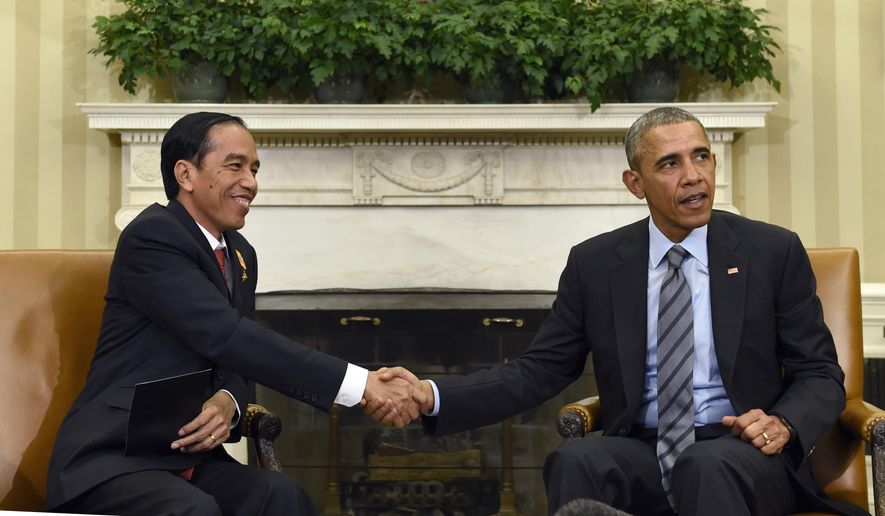In a Washington visit overshadowed by raging forest and peat fires back home, Indonesian President Joko Widodo said during a meeting with President Obama Monday that his country intends to join the Trans-Pacific Partnership trade deal that the U.S. forged with 11 other Pacific Rim countries.
“Indonesia is an open economy. And with the largest population in southeast Asia, we are the largest economy in southeast Asia, and Indonesia intends to join the TPP,” Mr. Widodo said.
If Indonesia joins the free-trade pact, it would be the fourth-largest economy in Asia to take part, leaving South Korea and China as the only bigger economies not covered by the agreement. Japan also has signed on to the TPP, which Mr. Obama views as a key component of his foreign policy “pivot” to Asia and a counterbalance to China’s economic power.
Mr. Obama didn’t discuss TPP directly in comments later to reporters. In a joint statement, the two leaders pledged only to “further deepen economic ties” between the countries.
Even without Indonesia included in the accord, the trade pact will cover about 40 percent of the world’s economic output. Adding Indonesia to the agreement, which could take up to two years, would include an economy with an estimated $1 trillion in gross domestic product.
U.S. Trade Representative Michael Froman said Indonesia needs to more to cut red tape, protect intellectual property rights and other steps.
SEE ALSO: Budget deal ‘manure,’ conservative critics say
“As we have said from the beginning, TPP is intended to be an open platform to which other countries who are able and willing to meet the standards can potentially accede,” he said at a business summit hosted by the U.S. Chamber of Commerce.
China has also made noises in recent days about eventually signing on to the trade pact, with the official state media over the weekend suggesting Beijing hasn’t ruled out joining eventually.
During an Oval Office meeting, Mr. Obama and the new leader of the world’s most populous Muslim nation of 250 million also discussed climate change, strengthening Indonesia’s maritime security powers, and the forest fires in Indonesia that are forcing Mr. Widodo to cut short his trip to the U.S.
Mr. Widodo announced Monday that he was flying home sooner than originally planned “to coordinate the humanitarian response to haze caused by forest fires” in Sumatra and Borneo. The fires and resulting smog have killed several people, and nearly 300,000 Indonesians have sought medical attention for respiratory illnesses due to the choking haze.
Schools and airports have been closed, and the damage may exceed $14 billion. Much of the fires are occurring on peatland.
“As President Joko Widodo flew to Washington, Indonesian citizens were fleeing from some of the worst forest fires that we have ever seen,” said Greenpeace Southeast Asia’s Indonesia Forests campaign leader Bustar Maitar. “President Widodo’s decision to fight these fires by protecting and restoring peatlands is a good first step although protection needs to cover forests too.”
Mr. Obama, who lived in Indonesia with his mother and stepfather for about four years while he was in elementary school, made a brief reference in his remarks to reporters about “helping Indonesia deal with the current difficulties surrounding peat fires.”
He also mentioned the personal bond he feels with the nation and called it “a large Muslim country with a tradition of tolerance and moderation.” He praised Mr. Widodo for “moving Indonesia in the right direction.”
“Whether it’s helping Indonesia deal with the current difficulties surrounding peat fires or encouraging more and more student exchanges between our two countries, this meeting signifies us taking this partnership to the next level,” Mr. Obama said.
• Dave Boyer can be reached at dboyer@washingtontimes.com.




Please read our comment policy before commenting.